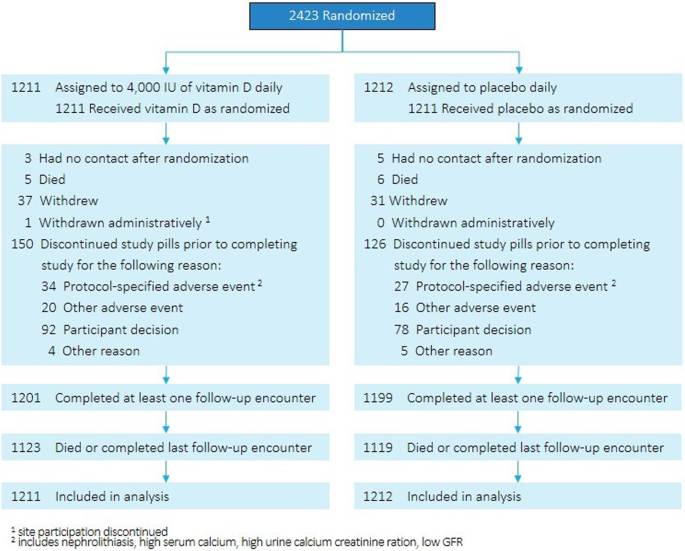Do high doses really suppress the immunoresponse? Then how can we explain this study. Remember in the hierarchy of legitimacy randomized clinical trials are right up there at the top, much more acceptable than expert opinions. This study clearly demonstrates ho well larger doses of D3 prevented mortality.
In conclusion, the administration of 10,000IU/day of vitamin D3 for 14 days in association with the standard clinical care during hospitalization for COVID-19 was safe, tolerable, and beneficial, thereby helping to improve the prognosis during the recovery process.
Cervero M, López-Wolf D, Casado G, Novella-Mena M, Ryan-Murua P, Taboada-Martínez ML, Rodríguez-Mora S, Vigón L, Coiras M, Torres M.
Beneficial Effect of Short-Term Supplementation of High Dose of Vitamin D3 in Hospitalized Patients With COVID-19: A Multicenter, Single-Blinded, Prospective Randomized Pilot Clinical Trial. Front Pharmacol. 2022 Jul 4;13:863587. doi: 10.3389/fphar.2022.863587. PMID: 35860019; PMCID: PMC9289223.
Here is another one
Aranow C.
Vitamin D and the immune system. J Investig Med. 2011 Aug;59(6):881-6. doi: 10.2310/JIM.0b013e31821b8755. PMID: 21527855; PMCID: PMC3166406.
"Deficiency in vitamin D is associated with increased autoimmunity and an increased susceptibility to infection. As immune cells in autoimmune diseases are responsive to the ameliorative effects of vitamin D, the beneficial effects of supplementing vitamin D-deficient individuals with autoimmune disease may extend beyond the effects on bone and calcium homeostasis."
More.....
Sheikh V, Kasapoglu P, Zamani A, Basiri Z, Tahamoli-Roudsari A, Alahgholi-Hajibehzad M.
Vitamin D3 inhibits the proliferation of T helper cells, downregulate CD4+ T cell cytokines and upregulate inhibitory markers. Hum Immunol. 2018 Jun;79(6):439-445. doi: 10.1016/j.humimm.2018.03.001. Epub 2018 Mar 6. PMID: 29522785.
Abstract
1 α, 25-dihydroxyvitamin D3 (VitD3) has been suggested to have strong modulatory properties in the immune system. Researchers in the present study primarily aimed to understand the effect of VitD3 on human CD4+ T cell proliferation in antigen presenting cells (APCs) free condition in vitro. The effect of VitD3 on intracellular cytokine responses trend to Th1, Th2, Th17 and Th22 was evaluated using the flow cytometry. Moreover the effect of VitD3 on the expression of inhibitory markers such as PD1, PD-L1, and CTLA4 which are induced upon polyclonal T cell receptor (TCR) activation on CD4+ T cells, was assessed. We observed that the stimulation of CD4+ T cells with VitD3, suppressed proliferation capacity, enhanced the expression of PD1, PD-L1 and CTLA4 inhibitory markers on CD4+ T cells, and diminished the percentage of pro-inflammatory cytokines including, IFN-γ, IL-17, and IL-22 except IL-4 in CD4+ T cells. The data suggested a potential insight into the consideration of VitD3 in the prevention/control of pro-inflammatory immune response/autoimmune disorders.
I could literally go on and on with this but I am sure most of us got the point already. I have never had the media influence any of my decision and most likely would reject anything I hear in the media. On the subject of D3, I have literally spent hundreds of hour reading the available research since the 1st report of Covid 19 hit the media. Like all vitamins I know they each have their own specific importance but I had no idea how specifically important D3 was. D3 is also a very important supplement in cases of long covid cases. I sat down and discussed this in depth with a Houston medical researcher who helped my wife.
Is D3 safe for the long haul?
Maalouf J, Nabulsi M, Vieth R, Kimball S, El-Rassi R, Mahfoud Z, El-Hajj Fuleihan G.
Short- and long-term safety of weekly high-dose vitamin D3 supplementation in school children. J Clin Endocrinol Metab. 2008 Jul;93(7):2693-701. doi: 10.1210/jc.2007-2530. Epub 2008 Apr 29. PMID: 18445674; PMCID: PMC2729206.
Methods: To assess short-term safety, 25 subjects randomly received placebo or vitamin D(3) at doses of 14,000 IU/wk for 8 wk. To assess long-term safety, 340 subjects randomly received placebo, vitamin D(3) as 1,400 IU/wk or 14,000 IU/wk for 1 yr. Biochemical variables were monitored at 0, 2, 4, 6, and 8 wk and 8 wk off therapy in the short-term study and at 0, 6, and 12 months in the long-term study.
Results: In both the short- and long-term studies, mean serum calcium and 1,25-hydroxyvitamin levels did not change in any group. In the short-term study, mean 25-hydroxyvitamin concentrations increased from 44 (+/- 11) to 54 (+/- 19) ng/ml in the treated groups (P = 0.033). In the long-term study, mean 25-hydroxyvitamin D levels increased from 15 +/- 8 to 19 +/- 7 ng/ml (P < 0.0001) in subjects receiving 1,400 IU/wk and from 15 +/- 7 to 36 +/- 22 ng/ml (P < 0.0001) in the group receiving 14,000 IU/wk.
No subject developed vitamin D intoxication.
Conclusion: Vitamin D(3) at doses equivalent to 2000 IU/d for 1 yr is safe in adolescents and results in desirable vitamin D levels.
Once more and I am headed off to bed for the night:
Routine use of vitamin D supplements has increased substantially in the United States. However, the safety and tolerability of long-term use of high-dose vitamin D are not known. We assessed the safety and tolerability of high-dose, daily vitamin D3 in the vitamin D and type 2 diabetes (D2d)...

www.nature.com


















